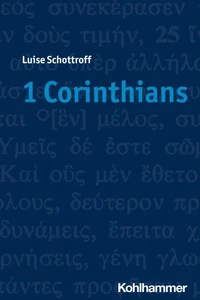This commentary shows the way in which Paul interprets the Torah for the Gentiles: concretely, realistically, sensitively, and argumentatively. He looks for images of a hope capable of withstanding death. He records the prayers and songs that were sung in the messianic communities of his time. And: he contradicts himself, particularly in his conception of what women should be like and in his factual dealings with them.
The fact that the letter includes the notorious misogynistic sentences that were written in Paul=s name is often the first association it calls up today. In addition, the letter is burdened by a long and prominent tradition of interpretation that used Paul to justify Christian positions of domination: the figure of Paul was used as a projection screen for Christian office-holders and their conceptions of domination over believers.
Even more ominously, Paul epitomized a search for Christian identity by distinguishing it negatively from Judaism, which was regarded as a ?religion of the law=. A rediscovery of Paul is overdue. The first edition of this commentary on the First Letter to the Corinthians was published in 2013; for the new edition, the bibliography has been supplemented with more recent publications & in the spirit of Luise Schottroff, who was never concerned with completeness, but rather with relevance for a fresh reading of Paul that makes use of social history and criticism of empire and is gender-aware.
Minor errors in the text have been corrected and a few additions have been made. The interpretation is enduringly up-to-date and represents the current state of international Pauline research. Luise Schottroff=s interpretation of the letter makes it possible to develop different perspectives on the text and make them fruitful for one=s own further research. Even five years after her death, she is an important teacher for those who are looking for their own critical and life-affirming approach to theology and exegesis.
This commentary shows the way in which Paul interprets the Torah for the Gentiles: concretely, realistically, sensitively, and argumentatively. He looks for images of a hope capable of withstanding death. He records the prayers and songs that were sung in the messianic communities of his time. And: he contradicts himself, particularly in his conception of what women should be like and in his factual dealings with them.
The fact that the letter includes the notorious misogynistic sentences that were written in Paul=s name is often the first association it calls up today. In addition, the letter is burdened by a long and prominent tradition of interpretation that used Paul to justify Christian positions of domination: the figure of Paul was used as a projection screen for Christian office-holders and their conceptions of domination over believers.
Even more ominously, Paul epitomized a search for Christian identity by distinguishing it negatively from Judaism, which was regarded as a ?religion of the law=. A rediscovery of Paul is overdue. The first edition of this commentary on the First Letter to the Corinthians was published in 2013; for the new edition, the bibliography has been supplemented with more recent publications & in the spirit of Luise Schottroff, who was never concerned with completeness, but rather with relevance for a fresh reading of Paul that makes use of social history and criticism of empire and is gender-aware.
Minor errors in the text have been corrected and a few additions have been made. The interpretation is enduringly up-to-date and represents the current state of international Pauline research. Luise Schottroff=s interpretation of the letter makes it possible to develop different perspectives on the text and make them fruitful for one=s own further research. Even five years after her death, she is an important teacher for those who are looking for their own critical and life-affirming approach to theology and exegesis.

 , qui est-ce ?
, qui est-ce ?